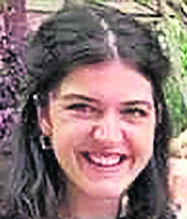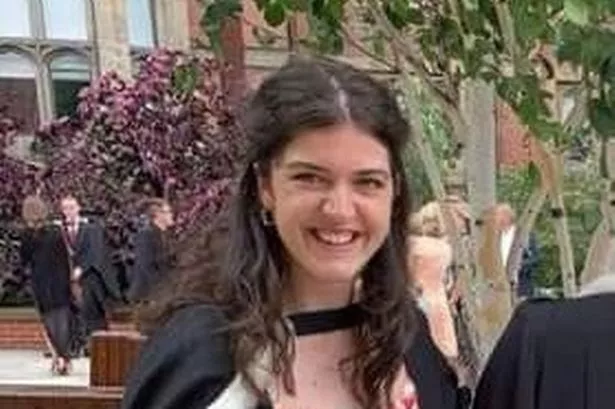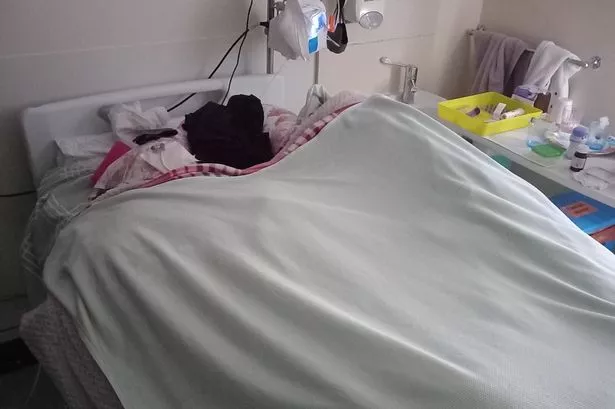Countrygirl
Senior Member
- Messages
- 5,468
- Location
- UK
During the past week, I have posted about the plight of Sami Berry and Alice Barrett.
Alice has severe ME and PoTS and Sami has severe ME and EDS.
Both are unable to eat and are left to starve in hospital.
Alice is in the Wonford Hospital, Exeter, which is responsible for the death of Maeve Boothby O'Neil in 2021 because they refused to give her a feeding tube when she needed it to survive. Exactly the same is happening to Alice because they refuse to feed her unless she can sit up 30-45 degrees which she is too ill to do. She hasn't been able to eat since before Christmas and is left starving in the ward with her mother and sister caring for her 24/7. The Wonford consultant in charge is currently being inflexible and will not change their feeding protocols to adapt to the clinical needs of the patient.
Today, The Times published an article on the situation after interviewing Alice and Sami's families and Dr William Weir.
The following two links take you to the previous threads on the two young women and The Times article is below.
https://forums.phoenixrising.me/thr...-save-alice-barretts-life.89572/#post-2427010
https://forums.phoenixrising.me/thr...-to-death-in-nhs-hospital.89565/#post-2426949
The Times article:
Families fear ME patients will die in hospital care
Kat Lay - Health Editor

Alice Barrett, 25
Next image ›
The families of two women being treated in NHS hospitals fear they are at risk of dying from starvation.
Alice Barrett, 25, who has severe myalgic encephalomyelitis (ME), is being cared for by the Royal Devon and Exeter NHS Foundation Trust.
Her father, Mark, said doctors were ignoring advice from family and ME experts on how best to treat her, warning: “Alice will die. And we haven’t got much time at all.”
She is in the hospital where Maeve Boothby-O’Neill, the daughter of the Times journalist Sean O’Neill, died of ME two years ago.
Meanwhile, relatives of Sami Berry, 43, a mother of three, fear she is close to death in Royal Berkshire Hospital (RBH). She has multiple illnesses, including epilepsy, Ehlers-Danlos syndrome (EDS), and severe ME.
“I am slowly watching my wife die in front of my eyes,” Craig Berry said. “The doctors at the hospital are refusing to provide her with drugs that previously helped her regain nutritional levels.”
Sami Berry was first admitted to hospital over Christmas and New Year’s Eve because she was unable to keep any food, liquid or medication down.
Doctors fitted her with a tube that provided nutrition and drugs directly to the small intestine. She was discharged on anti-emetic drugs that could be injected into muscles, after finding that the tablet and liquid forms delivered via that tube were not helpful.
However, when those drugs ran out 12 days after discharge, community and hospital doctors refused to prescribe more. “This resulted in Sami having an epileptic seizure at the top of the stairs and falling down them, forcing her to be readmitted to RBH, where she has been since January 30,” Craig Berry said.
Campaigners fear the women are falling foul of a misconception of ME as a psychological illness, and a lack of training for NHS staff on the most severe forms of the condition. William Weir, a retired consultant in infectious diseases with a special interest in ME, said: “There’s now a lot of scientific evidence which supports the proposition that this condition has a primary physical, pathological basis.”
Weir authored a paper published last year describing five cases in which NHS hospitals had denied treatment to patients with severe ME, which can be triggered by an infection.
The campaign group ME Action said: “The complex chronic illness communities have mourned too many losses. We will not stand for one more. The NHS should and can do better.”
The RBH said: “Our clinical teams are in ongoing talks with Ms Berry and her family about her condition and most appropriate treatment. We cannot comment on the specifics to preserve patient confidentiality. However, as a trust, our highest priority is always providing safe, appropriate, and high-quality care to Ms Berry.”
The Royal Devon and Exeter NHS Foundation Trust was approached for comment. Professor Adrian Harris, the chief medical officer at the Royal Devon University Healthcare NHS Foundation Trust, said: “ME is an incredibly complex and poorly understood disease. It is recognised that there is a global lack of evidence for the safe treatment and maintenance of people living with ME. This was highlighted in recent Nice guidance, particularly when it comes to those with severe ME.
“The safety of all of our patients is of paramount importance to us. We are always focused on providing the best care and experience for all our patients, in line with national clinical guidance
Alice has severe ME and PoTS and Sami has severe ME and EDS.
Both are unable to eat and are left to starve in hospital.
Alice is in the Wonford Hospital, Exeter, which is responsible for the death of Maeve Boothby O'Neil in 2021 because they refused to give her a feeding tube when she needed it to survive. Exactly the same is happening to Alice because they refuse to feed her unless she can sit up 30-45 degrees which she is too ill to do. She hasn't been able to eat since before Christmas and is left starving in the ward with her mother and sister caring for her 24/7. The Wonford consultant in charge is currently being inflexible and will not change their feeding protocols to adapt to the clinical needs of the patient.
Today, The Times published an article on the situation after interviewing Alice and Sami's families and Dr William Weir.
The following two links take you to the previous threads on the two young women and The Times article is below.
https://forums.phoenixrising.me/thr...-save-alice-barretts-life.89572/#post-2427010
https://forums.phoenixrising.me/thr...-to-death-in-nhs-hospital.89565/#post-2426949
The Times article:
Families fear ME patients will die in hospital care
Kat Lay - Health Editor

Alice Barrett, 25
Next image ›
The families of two women being treated in NHS hospitals fear they are at risk of dying from starvation.
Alice Barrett, 25, who has severe myalgic encephalomyelitis (ME), is being cared for by the Royal Devon and Exeter NHS Foundation Trust.
Her father, Mark, said doctors were ignoring advice from family and ME experts on how best to treat her, warning: “Alice will die. And we haven’t got much time at all.”
She is in the hospital where Maeve Boothby-O’Neill, the daughter of the Times journalist Sean O’Neill, died of ME two years ago.
Meanwhile, relatives of Sami Berry, 43, a mother of three, fear she is close to death in Royal Berkshire Hospital (RBH). She has multiple illnesses, including epilepsy, Ehlers-Danlos syndrome (EDS), and severe ME.
“I am slowly watching my wife die in front of my eyes,” Craig Berry said. “The doctors at the hospital are refusing to provide her with drugs that previously helped her regain nutritional levels.”
Sami Berry was first admitted to hospital over Christmas and New Year’s Eve because she was unable to keep any food, liquid or medication down.
Doctors fitted her with a tube that provided nutrition and drugs directly to the small intestine. She was discharged on anti-emetic drugs that could be injected into muscles, after finding that the tablet and liquid forms delivered via that tube were not helpful.
However, when those drugs ran out 12 days after discharge, community and hospital doctors refused to prescribe more. “This resulted in Sami having an epileptic seizure at the top of the stairs and falling down them, forcing her to be readmitted to RBH, where she has been since January 30,” Craig Berry said.
Campaigners fear the women are falling foul of a misconception of ME as a psychological illness, and a lack of training for NHS staff on the most severe forms of the condition. William Weir, a retired consultant in infectious diseases with a special interest in ME, said: “There’s now a lot of scientific evidence which supports the proposition that this condition has a primary physical, pathological basis.”
Weir authored a paper published last year describing five cases in which NHS hospitals had denied treatment to patients with severe ME, which can be triggered by an infection.
The campaign group ME Action said: “The complex chronic illness communities have mourned too many losses. We will not stand for one more. The NHS should and can do better.”
The RBH said: “Our clinical teams are in ongoing talks with Ms Berry and her family about her condition and most appropriate treatment. We cannot comment on the specifics to preserve patient confidentiality. However, as a trust, our highest priority is always providing safe, appropriate, and high-quality care to Ms Berry.”
The Royal Devon and Exeter NHS Foundation Trust was approached for comment. Professor Adrian Harris, the chief medical officer at the Royal Devon University Healthcare NHS Foundation Trust, said: “ME is an incredibly complex and poorly understood disease. It is recognised that there is a global lack of evidence for the safe treatment and maintenance of people living with ME. This was highlighted in recent Nice guidance, particularly when it comes to those with severe ME.
“The safety of all of our patients is of paramount importance to us. We are always focused on providing the best care and experience for all our patients, in line with national clinical guidance


